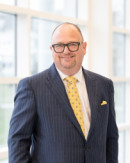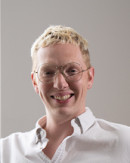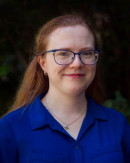Faculty and Staff for the Environmental Fellows Program
- Academics
- Honor Scholars & Fellow Programs
- Environmental Fellows Program
- About the Program
- Faculty and Staff
Meet Our Faculty and Staff
Co-Directors
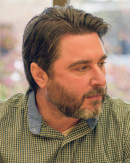
Harry J. Brown, Ph.D.
Professor of English
More Information
Bio
Harry Brown (Ph.D., Lehigh University) teaches early American literature, Native American literature, literature of the environment, game studies, and cultural analytics. His first book, Injun Joe’s Ghost (2004), examines the figure of the Native American mixed-blood in American writing. His second, Videogames and Education (2008) considers the relation between video games and the humanities. He has published articles on American literature and culture in The Journal of American and Comparative Culture, Studies in Medievalism, and Paradoxa, as well as original fiction in Blueline and The Mississippi Review. His most recent research involves environmental crisis narratives and American gravestone verse. His recent courses include "American Literature: Revolution and Renaissance," "Native American Literature," "American Literature and the Environment," and "First Year Seminar: Introduction to Ludology."
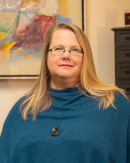
Jeanette K. Pope, Ph.D.
Director of Sustainability and Professor of Geology and Environmental Geoscience
More Information
Bio
Dr. Jeanette Pope joined the Department of Geosciences at DePauw University in 2002 and is now a full Professor and the Director of the Ullem Campus Farm and Center for Sustainability. She teaches several sustainability-themed courses, including a First-Year Seminar entitled "Campus Sustainability 101" and an upper-level honors course called "Food Systems and Sustainability". Her classes blend theory with practice and allow students to explore content in applied settings like the Ullem Campus Farm. As a self-described tree hugger, Jeane is also personally motivated to provide students of all disciplinary backgrounds not only the knowledge and skills that they can use to envision an environmentally just and sustainable world, but also the courage and fortitude to work towards their vision. Her research interests involve using the university campus as a living laboratory for sustainable systems. As such, she actively works with students, faculty, staff, and administrators to help promote and advance sustainability activities on campus, both in and out of the classroom.
Assistant Director
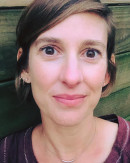
Amber Hecko
Environmental Fellows Program and Science Research Fellows Program
More Information
Bio
Amber Hecko joined the staff of the Environmental Fellows Program in 2014. She is a DePauw alum with a degree in English Literature and has worked as a business owner and professional photographer. Amber's interests include how environmental topics are explored through art and media along with education and community outreach.
Program Steering Committee
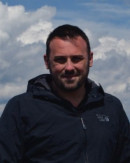
Ken Brown, Ph.D.
Assistant Professor of Geology and Environmental Geoscience
More Information
Bio
Dr. Ken Brown is a geologist that teaches several courses in the Department of Geosciences, including mineralogy, petrology, introduction to environmental science, and earthquakes and volcanoes. His primary research combines fieldwork, elemental and isotopic analyses, geochronology, and high-spatial resolution techniques to place important constraints on ancient volcanic systems. Dr. Brown also conducts environmental research aimed at characterizing heavy metal contamination within urban environments. His research is a part of the Metal Redlining Network, which is a collaborative research effort focused on characterizing the metal burden in urban environments within the context of structurally racist housing policies and practices.
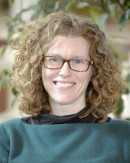
Sharon Crary, Ph.D.
Professor of Chemistry and Biochemistry
More Information
Bio
Sharon Crary is a Professor of Chemistry and Biochemistry at DePauw University, where she teaches courses in biochemistry and global health. Her research and teaching explore the intersections of biochemistry and health, with a particular focus on global health initiatives. She has extensive experience working in Uganda, including collaborations with Lacor Hospital. Her work bridges science and social responsibility, preparing students to address pressing scientific and global health challenges.
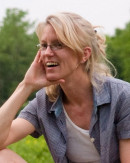
Jennifer J. Everett, Ph.D.
Associate Professor of Philosophy
More Information
Bio
Jen Everett came to DePauw in 2006. She teaches courses in ethical theory, environmental ethics, animal ethics, and ethics and economics. From 2006-07 she served as DePauw's first Sustainability Programs Coordinator. She has published on sustainability in higher education, vegetarianism, and the significance of nonhuman predation in animal ethics. Her current research focuses on waste, consumption, and the ethics of stuff.
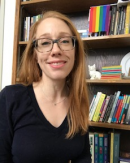
Christy Holmes, Ph.D.
Associate Professor of Women's, Gender, and Sexuality Studies
More Information
Bio
Christy Holmes is an Associate Professor of Women's, Gender, and Sexuality Studies with research interests in ecofeminism, queer ecologies, and Latinx environmentalisms and regularly offers a course on gender and climate justice. Her first book, Ecological Borderlands: Body, Nature, and Spirit in Chicana Feminism, looks at how the expression of ecological consciousness emerges through Mexican-American women's literature, visual art, and activism over the last 40 years. She is currently working on a book on eco-pedagogies that aims to provide tools of feminist analysis to a broader audience across the academy, empowering faculty across the curriculum to teach out of eco-social justice frameworks with more confidence and skill.
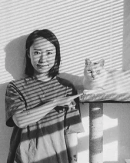
Dahee Yun, MFA
Assistant Professor of Film and Media Arts
More Information
Bio
Dahee Yun joined the Film and Media Arts program at DePauw University as an assistant professor in 2022. She offers a range of courses that cover both theoretical and production aspects of film and media, including Introduction to Digital Film Production, Documentary Filmmaking, Making the Video Diary, and K-Pop and K-Drama. As an artist and filmmaker, her work frequently explores relationships with non-human beings, immigrants, vulnerability, the concept of “floating” life or beings, and questions the boundaries.
Former Steering Committee Members
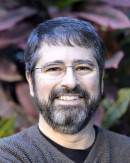
J. H. (Jim) Benedix Jr., Ph.D. (Co-Director 2011-2015)
Professor of Biology and Biological Coordinator of the DePauw Nature Park
More Information
Bio
Jim Benedix is a biologist who came to DePauw University in 1993. His teaching and research interests lie at the interface of ecology, evolution, and behavior. His most recent research focuses on the effect of climate change on trees, though he has also worked on frogs, crickets, and several species of small mammals. During his career he has done field research in Maine, Arizona, Kansas, California, Indiana, Colorado, and Puerto Rico, and has had research collaborations with well over 50 DePauw students.
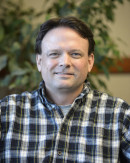
Tim Cope, Ph.D.
Professor of Geology and Environmental Geoscience
More Information
Bio
Dr. Cope is a geologist that came to DePauw from Stanford University in 2003. He teaches several courses in the Department of Geosciences, including Earth and the Environment, Introduction to GIS, Sedimentology and Stratigraphy, and field geology courses during Spring and Winter Term. For the past 13 years he has conducted summer research with DePauw students in China, where he describes his fieldwork as “climbing mountains to read the rocks”. His most recent research project was funded by NSF with collaborators at China University of Geosciences and the University of Arizona, and involved unraveling the tectonic development of northeastern China.
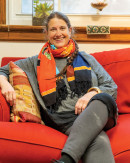
Rachel M. Goldberg, Ph.D.
Associate Professor of Peace and Conflict Studies, Director of the Peace and Conflict Studies Program
More Information
Bio
Dr. Rachel Goldberg was originally trained as a mediator at Oberlin College, and has been active in the conflict studies field for many years. Her work and training background include: individual, organizational, and multi-party interventions; and working around controversial issues such as pro-life/pro-choice activism, police accountability, and Native American claim conflict. She has jointly founded one mediation center and coordinated two others. Dr. Goldberg is a longtime specialist and trainer in cross-cultural and diversity work, particularly at the group and community level. She has her own consulting business and is the coordinator of the DePauw Restorative Justice/Mediation Program.
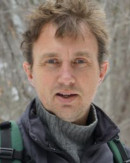
Joe Heithaus, Ph.D. (Co-Director 2020-2024)
Professor of English
More Information
Bio
Joseph Heithaus won the 2007 "Discovery"/The Nation Prize for a group of sonnets about poison plants that are now the central thread of his first book, Poison Sonnets (2012). Prof. Heithaus earned a Ph.D. and an M.F.A. from Indiana University and his work has appeared in numerous journals including Poetry, The Atlanta Review, The North American Review, The Southern Review, and Prairie Schooner. His poem "Indiana Flight" is etched in the stained glass mural of British artist Martin Donlin in the Indianapolis International Airport and with the other "airpoets", he is published in Rivers, Rails, and Runways (2008) and Airmail (2011). His poem, "What Grows Here" can be found painted on a barn just outside of Greencastle on West Walnut Street. He has taught literature and writing at DePauw since 1996.
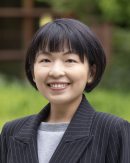
Yen-Yu Lin, Ph.D.
Assistant Professor of Sociology and Anthropology
More Information
Bio
Prof. Yen-Yu Lin received her sociology Ph.D. from the University of Virginia (2023). In August 2023, she started as Assistant Professor of Sociology and Anthropology at DePauw University. She serve as a board member of the North American Taiwan Studies Association (2024-2027) and was the Program Director for the 2022 NATSA Annual Meeting in Washington, D.C. Additionally, Prof. Lin co-founded the Ngasan Maku Study Society in Tokyo during the 2014 Sunflower Movement as a college student, fostering interdisciplinary dialogues on Taiwan globally.
Prof. Lin specializes in global and transnational sociology, comparative-historical sociology, and the sociology of race and empires. Her specific research keywords include material culture, empires, race, and intersectionality. She is particularly interested in the relationship between material culture and systems of domination and how this relationship historically affects marginalized people. Her current book project, Colors of Empire: Visualizing Race in Taiwan under Japanese Colonial Rule, studies how racial categories were constructed and deconstructed through visual representations in colonial Taiwan.
Prof. Lin's other works-in-progress include (1) “Contouring system” (a theory of racial hierarchies) in colonial Taiwan; (2) Self-racialization in Japan and Korea (co-authored with Dr. Veda H. Kim); (3) "Embodied supremacy" theory, studying how East Asian women's bodies manifest the power structure of global white supremacy. Her research has been published in English, Mandarin, and Japanese, engaging with interdisciplinary audiences across sociology, history, and political science.
At DePauw, Prof. Lin teaches Introduction to Sociology, Social Theory, Global and Transnational Sociology, and Sociology of Art. She is looking forward to teaching a new course Sociology of Spirituality.
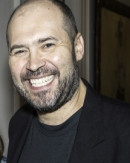
Richard C. Martoglio, Ph.D.
Associate Professor of Chemistry and Biochemistry
More Information
Bio
Rich Martoglio (Ph.D., University of Wyoming) came to DePauw University in 2002. He teaches courses in chemistry, primarily in the areas of analytical and inorganic chemistry. His research interests include understanding chemical reactions that take place at solid/solution interfaces and more recently, the development of techniques to detect certain neglected tropical diseases.
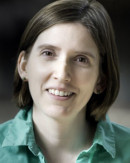
Lydia Marshall, Ph.D.
Edward Myers Dolan Professor of Anthropology and Associate Professor of Anthropology
More Information
Bio
At DePauw, Prof. Marshall teaches a variety of courses, including Human Origins, Archaeology, Archaeology Field School, Archaeology of the Body, and History of Anthropology. Her scholarship focuses on the archaeology of slavery and, more specifically, emancipated and self-emancipated people. Prof. Marshall has explored this topic in depth in her edited book, The Archaeology of Slavery: A Comparative Approach to Captivity and Coercion (2015). She has also published research in African Archaeological Review and the Journal of African Archaeology, among other journals. Prof. Marshall is currently associate editor of the Journal of African Diaspora Archaeology and Heritage.
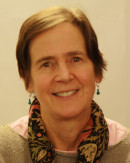
Marion (Marnie) McInnes, Ph.D.
Professor Emerita of English and Women's, Gender, and Sexuality Studies
More Information
Bio
Marnie McInnes taught courses on a range of topics at DePauw University, including workshops for students applying for the Fulbright, Gates-Cambridge, Goldwater, Udall, and Truman Scholarships. Other special topics courses that Marnie has designed and taught include an Honor Scholar humanities seminar on Haiti and a women and literature course titled “Science, Nature, Environment.” In January 2015, Marnie joined Kevin Kinney in the Biological Sciences department to offer one of DePauw’s new Extended Study courses. The course took place in the Galapagos Islands, where students studied, explored, and wrote about their experiences. Marnie received her B.A. from Stanford University and her Ph.D. in English Literature from Yale.
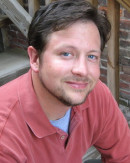
Greg Schwipps, MFA
Professor of English
More Information
Bio
Greg Schwipps received his M.F.A. from Southern Illinois University at Carbondale and his B.A. from DePauw University. He is the co-author of the second edition of Fishing For Dummies, and his novel, What This River Keeps, won a Eugene and Marilyn Glick Indiana Authors Award in 2010. He lives with his wife and two boys in Greencastle, Indiana.
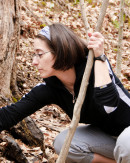
Janet Vaglia, Ph.D. (Co-director 2017-2023)
Professor of Biology
More Information
Bio
Dr. Janet Vaglia joined the Department of Biology at DePauw University in 2002 and teaches courses in Evolution and Development, Developmental Biology and Cells, Molecules and Genes. She has an avid interest in how fluctuations in an organisms' environment impact developmental processes. Her current research is in deciphering how salamanders are able to continually grow their tails as adults. The hypotheses that ongoing growth of the body axis could be linked to regeneration helped secure NIH funding for her research in 2010. She has worked with several students on this research and they enjoy making connections between the small, focused projects and bigger picture questions and implications. She describes how it is fun to consider how the research contributes to the ongoing search for mechanisms and factors that could induce regrowth of tissue (e.g. nervous tissue) in organisms that have lost the lateral ability to regenerate.
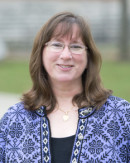
Michele T. Villinski, Ph.D. (Co-Director 2011-2014)
Professor Emerita of Economics and Management
More Information
Bio
Michele Villinski has been at DePauw University since 2000 and was named the 2012 Indiana Professor of the Year by the Carnegie Foundation for the Advancement of Teaching and the Council for Advancement and Support of Education (CASE). She teaches courses on environmental and resource economics, applied game theory, international economics, and microeconomics. Her current projects include expanding her use of case studies in teaching and learning to use spatial analysis in research. She spent part of her 2008-2009 sabbatical in Surabaya, Indonesia on a Fulbright fellowship.
